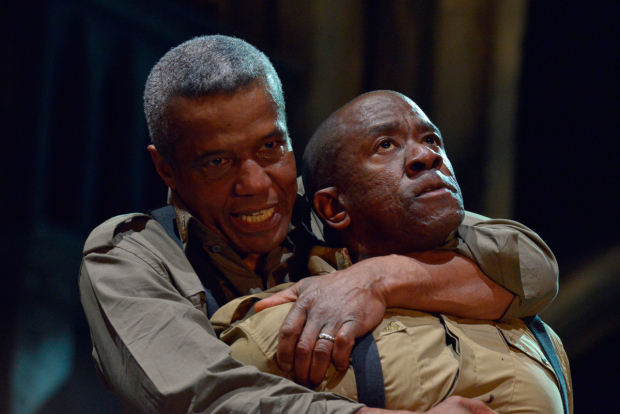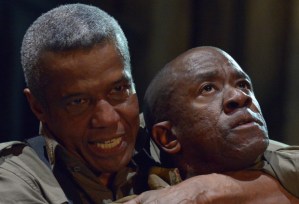Othello (Royal Shakespeare Theatre)
Hugh Quarshie and Lucian Msamati lead Iqbal Khan’s production

© Keith Pattison
Usually, Othello's blackness is the most obvious thing about him, and his descent into jealousy a symptom of innate foolishness. But in turning the ethnicity issue on its head, and having an Iago who is darker skinned than Othello, the RSC director Iqbal Khan makes you see the play anew.
Othello, played by Anglo-Ghanaian Hugh Quarshie, is a quiet and dignified soldier bamboozled into a suspicion of his wife's infidelity with another officer because he's never entered such complex emotional territory before. By the time he suffers the epileptic fit, he's not so much out of control as possessed by demons, a subtly different sort of condition. He's clearly not the same man who strikes Desdemona across the face.
And Iago, compellingly played by Anglo-Zimbabwean Lucian Msamati, with a richer, deeper voice than Quarshie's light and flexible tenor, upturns the sonic music of the play, too, presenting a man for whom inexplicable malevolence is not a pantomime but an ingrained way of looking at the world.
This readjustment of the play's parameters is reflected throughout the casting: Emilia, Iago's wife, as played by Ayesha Dharker is a gracefully garbed and sympathetic Samaritan; Jacob Fortune-Lloyd's knock-kneed Cassio more a buffoon than a drunkard in his downfall scene; Scarlett Brookes's Bianca, less surprisingly for a courtesan, perhaps, is a tattooed punk; and the Duke of Venice (Nadia Albina) a short-tempered woman devoid of any reason or understanding.
Although the text has been tampered with to a slight degree, there is no great song and dance about all this. It takes time, but you leave with a vibrantly renewed acquaintance with the play, not least because the seemingly demure Desdemona of Joanna Vanderham (the half Dutch, half Scottish actress who plays Denise Lovett in The Paradise on television, is making a fine RSC debut) develops so strongly.
She is tall and blonde, but also fierce and sexually alive. This, of course, makes Othello's plight more plausible and more tragic. We see Desdemona dangling her legs in the small onstage pool before unpinning her hair and sliding under the sheets in silk lingerie. She sleeps on a downstage mattress while the street fights engineered by Iago take place above. And when Othello comes to kill her, she still misinterprets his too-late reviving kiss as an overture and turns to embrace him.
Quarshie is now a fatally wounded animal himself, even as he murders. For this he may trade the rhetoric of steep down gulfs of liquid fire, but he still moves and terrifies in his more muted, pantherine manner.
The design and lighting of Ciaran Bagnall restore the proscenium properties of the new thrust stage with the Christian iconography of ruined stone arches and a rose window, with a hint of a crypt either side, while the sunken pool, not too obtrusive, is an image of the Venetian canals and Cypriot harbour.
That shift from Venice to Cyprus is elegantly suggested in the costumes of Fotini Dimou. And one last thing: the incriminating, strawberry-embroidered handkerchief, usually a pristine white, is here the darkest black of all.
Othello runs at the Royal Shakespeare Theatre until 28 August 2015













